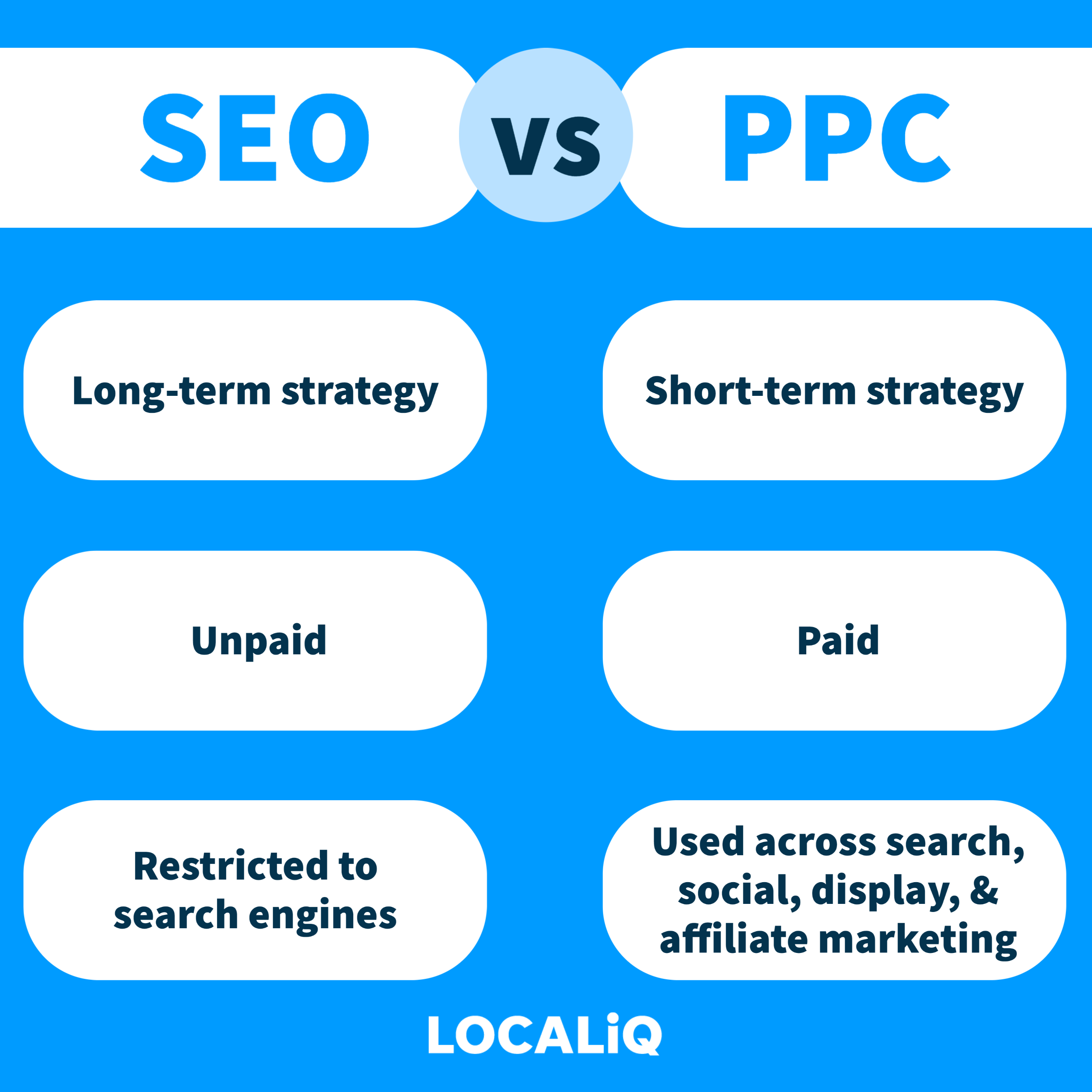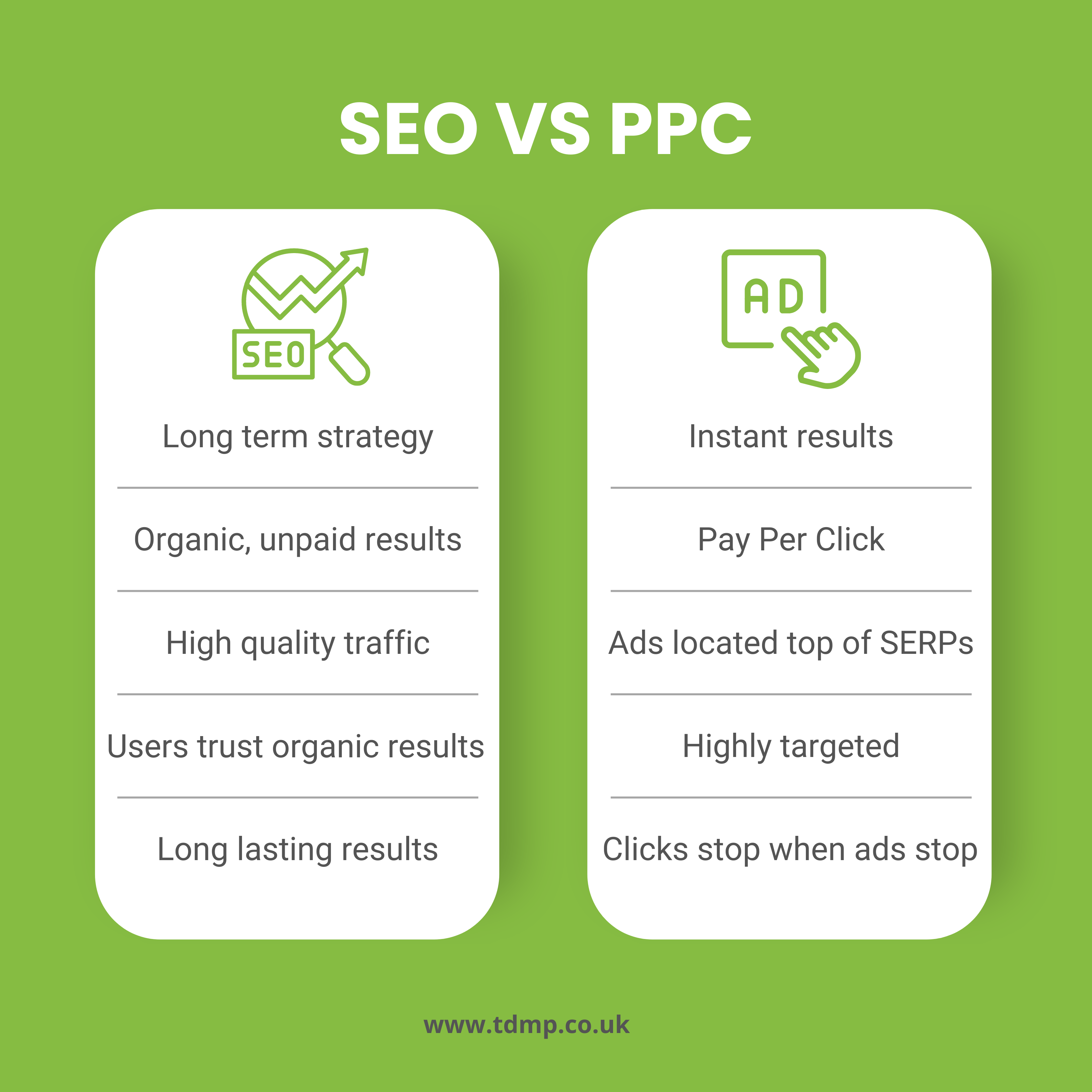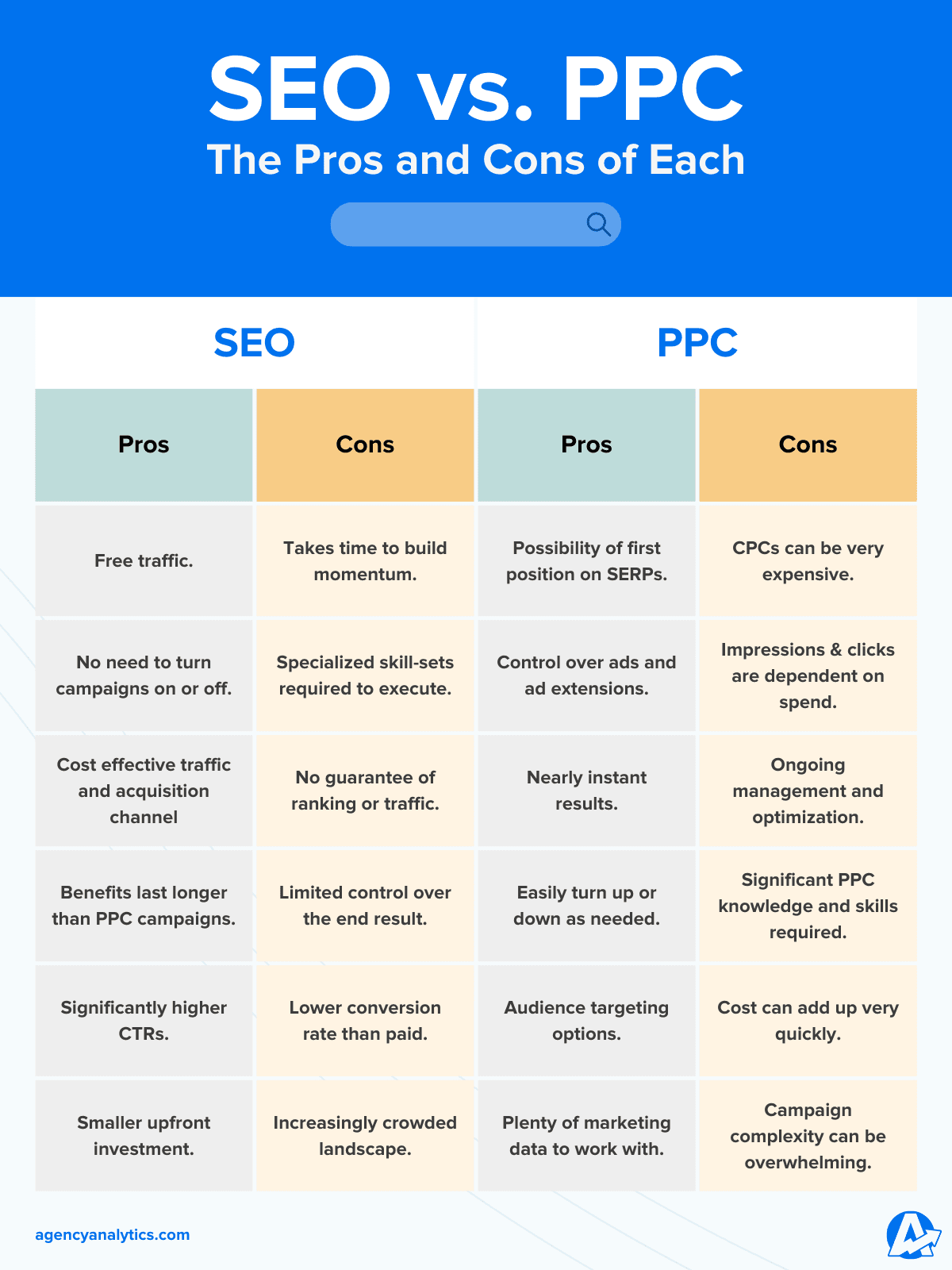SEO focuses on organic search rankings through optimization, while PPC involves paid ads for immediate visibility. Both strategies complement each other for maximizing online reach.
Understanding these differences helps businesses choose the right approach. SEO stands for Search Engine Optimization. It focuses on improving a website’s visibility organically. PPC, or Pay-Per-Click, is an advertising model where businesses pay for each click on their ads. While SEO takes time to show results, PPC can provide immediate visibility.
Knowing the strengths and weaknesses of each can help you plan your marketing efforts effectively. Let’s dive deeper into what sets SEO and PPC apart.
Introduction To Seo And Ppc
Understanding the difference between SEO and PPC is crucial for digital marketing. Both strategies have unique benefits. They also serve different purposes. This introduction provides an overview of SEO and PPC.
Definition Of Seo
SEO stands for Search Engine Optimization. It involves optimizing a website. The goal is to rank higher on search engines. SEO uses keywords, quality content, and backlinks. It also focuses on user experience. This helps attract organic traffic. It takes time to see results. But the benefits are long-lasting.
Definition Of PPC
PPC stands for Pay-Per-Click. It is an online advertising model. Advertisers pay each time someone clicks their ad. PPC ads appear on search engines. They can also appear on social media platforms. PPC provides quick results. It is ideal for boosting visibility fast. Unlike SEO, PPC requires a budget for ads.
Key Features Of Seo
Understanding the key features of SEO helps you optimize your website effectively. SEO, or Search Engine Optimization, focuses on improving your site’s visibility in search engines. It involves several strategies and techniques that contribute to better rankings and increased organic traffic. Let’s break down the main features of SEO to give you a clearer picture.
Organic Traffic
Organic traffic refers to visitors who find your site through search engines. They do not come through paid ads. This traffic is essential for long-term success. Good SEO practices improve your site’s ranking, leading to more organic visitors. Quality content, keyword optimization, and user experience drive organic traffic.
On-page Seo
On-Page SEO includes elements within your website. These elements help search engines understand your content. They also improve user experience. Key components include keyword usage, meta tags, and headers. Optimizing these elements makes your site more relevant to search queries. Internal linking and content quality also play a role.
Off-page Seo
Off-Page SEO involves activities outside your website. These activities help improve your site’s authority and reputation. Backlinks are a crucial part of Off-Page SEO. High-quality backlinks from reputable sites boost your site’s credibility. Social media engagement and online mentions also contribute. These factors collectively enhance your site’s visibility and ranking.
Key Features Of Ppc
Pay-Per-Click (PPC) advertising offers several key features that set it apart from other marketing strategies. Understanding these features helps you leverage PPC effectively for your business goals.
Paid Advertising
PPC is a form of paid advertising. You pay a fee each time someone clicks your ad. This method gives you instant visibility on search engines or social media. Unlike organic SEO, PPC guarantees your ad appears at the top of search results.
With PPC, you control your budget. You can set daily or monthly limits. This ensures you don’t overspend. PPC also allows you to test different ads. You can see which one performs best. This flexibility makes PPC an attractive option for many businesses.
Ad Auctions
In PPC, ads are placed through an ad auction. This is an automated process. Search engines decide which ads to show based on bids and ad quality. You bid on keywords relevant to your business. The highest bid does not always win. Search engines also consider the quality of your ad and landing page.
Ad auctions ensure fair competition. Everyone has a chance, regardless of budget size. This makes PPC accessible to both small and large businesses.
Targeting Options
PPC offers robust targeting options. You can target ads based on location, demographics, interests, and more. This precision ensures your ads reach the right audience. For instance, you can target people in a specific city. Or you can show ads to users interested in a particular topic.
Targeting options maximize your return on investment (ROI). You only pay for clicks from potential customers. This efficiency makes PPC a powerful tool in your marketing arsenal.

Credit: localiq.co.uk
Benefits Of Seo
Search Engine Optimization (SEO) offers many benefits for businesses. It helps improve online visibility and drive organic traffic. Here are some key benefits of SEO:
Long-term Results
SEO provides long-term results. Unlike PPC, SEO does not stop working when you stop paying. Once your site ranks well, it can stay there for a long time. This means you can keep getting traffic without ongoing costs. Your site becomes a valuable asset over time.
Cost-effectiveness
SEO is cost-effective in the long run. PPC requires constant payment for ads. With SEO, your initial investment can keep bringing returns. You do not need to pay for each click or impression. This makes SEO a smart choice for small businesses with tight budgets.
Credibility And Trust
Users trust organic search results more than paid ads. Ranking high in search results builds credibility and trust with users. They see your site as an authority in your field. This can lead to higher conversion rates and customer loyalty. People are more likely to click on your site if they trust it.
Benefits Of PPC
Pay-per-click (PPC) advertising offers many benefits for businesses. It can drive traffic quickly and offer tangible results. Let’s explore some key advantages of PPC advertising.
Quick Results
PPC campaigns yield immediate traffic. Once your ad is live, users can see it. This means you can start getting visitors to your site right away.
Unlike SEO, which takes time, PPC offers instant visibility. This is ideal for new products or promotions that need quick attention.
Measurable ROI
PPC lets you measure return on investment (ROI) easily. You can track clicks, impressions, and conversions. This data helps you understand which ads work best.
With detailed analytics, you can see how much each conversion costs. This transparency helps you optimize your campaigns for better performance.
Control Over Budget
PPC gives you complete control over your budget. You decide how much to spend daily or monthly. You can adjust the budget based on performance and goals.
This flexibility ensures you never overspend. You can also pause or stop campaigns whenever needed. This control is valuable for managing advertising costs effectively.
Challenges Of Seo
SEO, or Search Engine Optimization, is crucial for online visibility. However, it comes with several challenges. These challenges can make SEO a complex and time-consuming task for many. Below are some of the main challenges you may face when focusing on SEO.
Time-consuming
SEO is not a quick fix. It requires a lot of time and effort. You need to conduct keyword research, create quality content, and build backlinks. The results are not immediate. It often takes months to see significant improvements. Patience and consistency are essential.
Algorithm Changes
Search engines like Google frequently update their algorithms. These changes can impact your SEO efforts. What works today might not work tomorrow. Staying updated with these changes is essential. It requires continuous learning and adjustment.
High Competition
The online space is highly competitive. Many businesses are fighting for the same top spots in search results. High competition makes it challenging to rank higher. You need a well-planned strategy to outperform your competitors. Quality content and effective SEO techniques are vital.
Challenges Of Ppc
Pay-per-click (PPC) advertising can be a great way to drive traffic. Yet, it has its own set of challenges. Understanding these challenges is crucial for optimizing your PPC campaigns and getting the most out of your investment.
Costly Investment
PPC requires a significant financial commitment. Each click comes with a cost. If you want high-value keywords, you need a bigger budget. Small businesses may struggle with this. It’s easy to spend a lot without seeing a good return. Proper budget management is essential to avoid overspending.
Ad Fatigue
Users see the same ads repeatedly. This leads to ad fatigue. They start ignoring your ads. This reduces your ad’s effectiveness. You need fresh, engaging content to keep users interested. Regular updates to your ad copy and visuals are necessary.
Click Fraud
Click fraud is a big concern for PPC advertisers. Competitors or bots click on your ads. This drives up your costs without any real benefit. It wastes your budget and skews your data. Monitoring your campaigns for unusual activity is crucial. Many platforms offer tools to help combat click fraud.

Credit: www.tdmp.co.uk
When To Use Seo
Understanding the best time to use SEO can help maximize your digital marketing efforts. SEO, or Search Engine Optimization, focuses on improving your website’s visibility in organic search results. Here are some scenarios when you should prioritize SEO.
Building Authority
SEO is ideal for building authority in your niche. By creating high-quality content and earning backlinks from reputable sites, you can establish your site as a trusted resource. This process takes time but provides lasting benefits.
Content Marketing
SEO and content marketing go hand-in-hand. When you create valuable content that answers your audience’s questions, you can improve your search rankings. Consistently publishing blog posts, articles, and guides helps you attract and retain visitors.
| SEO Activity | Benefit |
|---|---|
| Blog Posts | Increases site traffic |
| Guides | Builds trust with audience |
| Articles | Improves search rankings |
Long-term Goals
If your focus is on long-term goals, SEO is the way to go. It may take months to see results, but the benefits are sustainable. SEO helps you build a strong online presence that lasts.
- Increases organic traffic
- Reduces dependency on paid ads
- Improves user experience
Investing in SEO now can pay off in the future. It builds a solid foundation for your online success.
When To Use PPC
When planning your digital marketing strategy, PPC (Pay-Per-Click) can be a powerful tool. Understanding when to use PPC can make a big difference. It offers immediate visibility, targeted campaigns, and is great for promotions and sales. Let’s explore these situations in more detail.
Promotions And Sales
PPC works well for short-term promotions and sales. You can quickly create ads. These ads can reach a large audience fast. This is perfect for holiday sales or limited-time offers. PPC ensures your promotions get noticed right away.
Targeted Campaigns
With PPC, you can target specific groups. You can choose who sees your ads based on age, location, and interests. This helps you reach the right people. Targeted campaigns increase the chances of your ad being effective. You spend money only on interested users.
Immediate Visibility
PPC offers immediate visibility. Your ads appear on search results right away. This is useful for new businesses. It helps build brand awareness quickly. Immediate visibility also helps in competitive markets. You can get noticed faster than through SEO alone.
Combining Seo And PPC
Combining SEO and PPC can create a powerful digital marketing strategy. Each has its unique strengths. Together, they can enhance your online presence. Below, we explore how integrating these two can benefit your business.
Integrated Strategies
Using both SEO and PPC creates a cohesive strategy. SEO builds organic traffic over time. PPC offers immediate visibility. Together, they balance short-term gains and long-term growth. A combined approach ensures you cover all bases.
- SEO: Long-term, cost-effective, trust-building
- PPC: Immediate results, targeted reach, budget control
Maximizing Reach
Combining SEO and PPC maximizes your reach. SEO helps you rank higher in organic search results. PPC ads appear at the top of search results. This dual presence increases the chances of attracting visitors. It ensures your brand is seen by more people.
- SEO drives consistent organic traffic.
- PPC captures immediate, targeted traffic.
- Both increase overall visibility.
Data Sharing
Data from PPC campaigns can inform your SEO strategy. PPC provides immediate feedback on keywords and ad performance. This data helps refine your SEO efforts. Likewise, SEO insights can improve PPC targeting. Sharing data between the two enhances both strategies.
| SEO Insights | PPC Insights |
|---|---|
| Keyword performance over time | Immediate keyword performance |
| Organic search trends | Ad click-through rates |

Credit: agencyanalytics.com
Frequently Asked Questions
What Is Seo?
SEO stands for Search Engine Optimization. It involves optimizing a website to rank higher in search engine results. The goal is to increase organic traffic to the site.
What Is Ppc?
PPC stands for Pay-Per-Click. It is an advertising model where advertisers pay each time someone clicks their ad. It’s a way to buy visits to your site.
How Do Seo And Ppc Differ?
SEO focuses on organic search results, while PPC involves paid advertising. SEO is a long-term strategy, whereas PPC provides instant results.
Is Seo Better Than Ppc?
Neither is inherently better; they serve different purposes. SEO builds long-term credibility. PPC drives immediate traffic. Both can be effective when used together.
Conclusion
Choosing between SEO and PPC depends on your needs. SEO offers long-term benefits. It builds organic traffic and credibility. PPC provides immediate results. It drives targeted traffic fast. Both strategies have their advantages. A balanced approach often works best. Combine SEO for sustainable growth.
Use PPC for quick wins. Evaluate your goals and budget. Then, decide the right mix. This way, you maximize your online presence. Make informed choices. Boost your business effectively.

